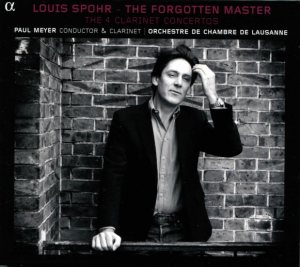 |
 |
|


alternatively
CD: MDT
AmazonUK
AmazonUS
Sound
Samples & Downloads |
Louis SPOHR (1784-1859)
Clarinet Concerto No 1 in C minor, Op 26 [18:51]
Clarinet Concerto No 2 in E flat, Op 57 [23:25]
Clarinet Concerto No 3 in F minor, WoO 19 [24:34]
Clarinet Concerto No 4 in E minor, WoO 20 [25:17]
 Lausanne Chamber Orchestra/Paul Meyer (clarinet)
Lausanne Chamber Orchestra/Paul Meyer (clarinet)
rec. 4-6 January 2012, Salle Métropole, Lausanne, Switzerland
 ALPHA 605 [42:16 + 49:51]
ALPHA 605 [42:16 + 49:51]
|
|
|
Louis Spohr’s first clarinet concerto starts with, of
all things, a drum roll, and we do not have to wait long for
the soloist’s entrance, clear hints of an early romantic
composer with innovation on the mind. It also starts with a
brazen plagiarism of Haydn’s 95th Symphony,
which Spohr uses as the allegro’s main theme. This is
Louis Spohr in a nutshell: a craftsman of great quality, a creator
of many surprising or pleasing sounds, but ultimately not an
original voice.
The first concerto is better than I’ve made it sound,
with a slow movement that’s little more than an introduction
to a clever finale that bounces between major and minor keys
like a ping-pong ball (it also hides a Mozart concerto quote
in the orchestral winds). The other three concertos assembled
here offer similar effervescent pleasures: anyone who likes
similar works by Weber or Crusell will love this.
My favorite might be the second concerto, which is the only
one in a major key but compensates for its lack of drama with
sheer delightful good spirits and, in the finale, some thrilling
virtuosity. The third, in F minor (key of Weber’s first
concerto), finds Spohr using a full orchestral introduction
for the first time in the set, and striking a very pleasing
balance between his chosen key and his natural humor and charm.
The fourth, in E minor, dates from 1828 and is the largest and
most serious, with a big brooding introduction but, conversely,
a cutesy “Spanish” finale which is more enjoyable
than it is authentic.
No presentation of the Spohr clarinet concertos can top this.
Paul Meyer is a superb soloist, one of our very best, and he
has all the technique, lightness of tone, and imagination needed
to present this music in the best possible light. I cite imagination,
by the way, because Spohr evidently made very few notes on articulations,
and Meyer’s choices always feel natural and ‘right.’
In the Lausanne Chamber Orchestra he has found a very successful
partnership, and the Alpha label’s top-end production
(the pack folds open bill-fold style to reveal the CDs and a
40-page booklet with extensive essays in English and French)
is a luxurious touch, although the track timings for the fourth
concerto are quite wrong. Throw in natural acoustics which very
warmly embrace the orchestra of 38 and the soloist, and this
is so good that it borders on essential for the classical-era
enthusiast.
Brian Reinhart
|
|




 All Nimbus reviews
All Nimbus reviews








